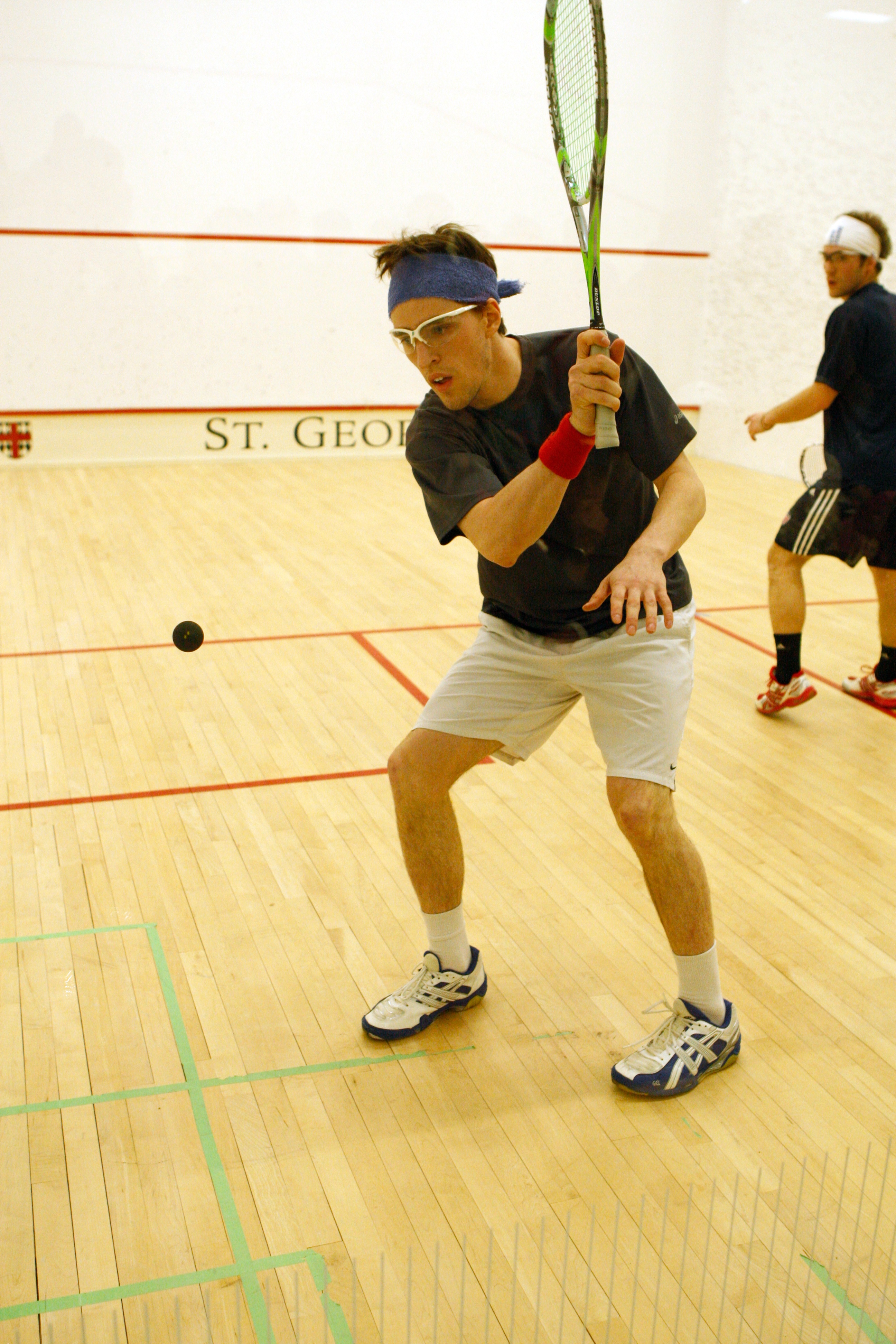Articles and Photos by Jay D. Prince/SquashMagazine.com
The 2010 U.S. Championships returned to their historic roots by spending the weekend in late March in Newport, Rhode Island. Not since 1997 had the annual event been staged in the sailing mecca of the east coast, back in the days when Mark Talbott was still winning titles.

Part of what makes the U.S. Championships special is creation and renewal of annual rivalries, not to mention the lifelong relationships that many players develop at the event. For some, the intrigue is trying year after year to win a national championship. For others, it’s trying to keep those title-seekers from wresting away what is theirs. As is true with most sports, division winners don’t necessarily change year to year, but the road to winning generally does. And that road can be geographic or figurative…or both.
When the Championships are hosted at universities, the masters players are welcomed to the hallowed courts made famous by historical matches played in intercollegiate squash. But when event returns to cities like Newport, Seattle or Atlanta, there’s something different. There’s the aura of past age-group champions that is remembered. Or there is the city itself rather than the venue that brings something memorable.
In Newport, there is a little of both. Nestled on the shores of the Atlantic, just a short drive from the Providence (RI) airport, with mansions on spectacular bluffs overlooking the ocean, this sailing paradise brings a small-town quaintness that is never duplicated in other Championship-host cities. Where else can you find scores of squash players hanging out at the Black Pearl for dinner and drinks?
Of the 200+ players competing at this year’s U.S. Championships, only five could look back on 1997 and reminisce about past successes. Greg Lahey, Dominic Hughes, Jay Nelson, Charles Butt, and Wendy Ansdell each won titles in Newport in 1997—Lahey, Men’s 30; Hughes, the Men’s 35; Nelson, the men’s 55; and Butt, the men’s 70; and Ansdell, the Women’s 30. Richard Chin, still competitive in the Men’s SL Green, was the runner-up in the Open division in 1997.
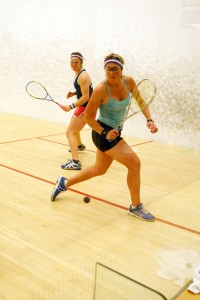 For the past five years, the men’s SL Green has really amounted to little more than “who is Julian Illingworth going to beat in the final.” No disrespect to those seeking to dethrone the perennial champion, but Illingworth hasn’t been tested since overcoming the stress of playing in front of his home crowd in Portland three years ago. But going into this year’s title run, there was renewed interest because of the recent success of Gilly Lane. Just a week before the Championships, Lane shocked the squash world by beating World No. 7, Peter Barker, in the opening round of a $50,000 PSA event in Montreal. While some would say Barker had an off day, the fact remains that Lane became just the second American player to win a main draw match in a major PSA tournament—ever. Illingworth, of course, being the other.
For the past five years, the men’s SL Green has really amounted to little more than “who is Julian Illingworth going to beat in the final.” No disrespect to those seeking to dethrone the perennial champion, but Illingworth hasn’t been tested since overcoming the stress of playing in front of his home crowd in Portland three years ago. But going into this year’s title run, there was renewed interest because of the recent success of Gilly Lane. Just a week before the Championships, Lane shocked the squash world by beating World No. 7, Peter Barker, in the opening round of a $50,000 PSA event in Montreal. While some would say Barker had an off day, the fact remains that Lane became just the second American player to win a main draw match in a major PSA tournament—ever. Illingworth, of course, being the other.
As expected, both Illingworth and Lane progressed to the final in Newport with relative ease. Illingworth claimed three-love wins over Richard Chin and Ryan Donegan in the quarters and semis, while Lane took out Scott Leighton, Graham Bassett and Chris Gordon by the same scores. Could this in fact be the year that someone else adds his name to the winner’s hardware?
No. Plain and simple. That’s not to say it was easy for Illingworth, because the first two games lasted nearly as long as the final that was being played in the Men’s 45+ on the other side of St. George’s squash facility. In fact, midway through the second game of that over-45 match, when Dominic Hughes was hit in the mouth by the racquet of Andre Maur, Illingworth and Lane were sitting at 7-all in the first game. And Illingworth, after winning the opening game 11-9, did drop the second 8-11. But that’s as close as Lane would get. Illingworth methodically moved closer to breaking the 87-year-old men’s record of six consecutive titles held by Stanley Pearson, equalling the mark with his four-game victory over Lane.
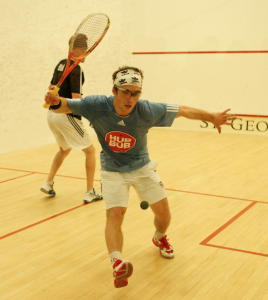
Streaks have been the name of the game in the Women’s Open for the past 10 years. First it was Latasha Khan rattling off five consecutive titles from 2002-2006 (plus the two she won in 1998 and 2000), and now Natalie Grainger who just won her fourth. Despite the small draws over the past few years, it is encouraging to see the two perennial powerhouse juniors, Olivia Blatchford and Amanda Sobhy, plying their trade in the Open at the U.S. Championships. Last year it was Blatchford who reached the semifinals to face Grainger; this year it was Sobhy taking on Grainger—in the finals.
In the absence of Khan, who did not play this year, there was little doubt that Grainger would extend her reign. However, unlike last year when Grainger was fresh off an impressive win on the WISPA tour over World No. 1, Nicol David, the three-time U.S. Champion was in the early stages of a comeback from a foot injury. Though her mobility was noticeably limited, her skills were not.
Grainger attacks the ball. Every shot has a purpose, whether hit hard and deep or very short. To watch her play is to watch someone determined to mercilessly show her opponent every inch of the court. And when the opening is there, she punishes the ball. And then moves on to the next point.
On the opposite half of the draw were the two juniors; perhaps future U.S. champions in the adult event. Blatchford and Sobhy have been separating themselves from the rest of the juniors in the US since they were in the U13. And over the past two years, they have beaten each other, neither establishing clear dominance. In December, Blatchford came out on top in the U.S. Junior Open. Just a week before the U.S. Championships, it was Sobhy who won the U.S. Junior Gold U19. At the U.S. Championships, Sobhy again pushed her way to a convincing four-game win in the semifinals.
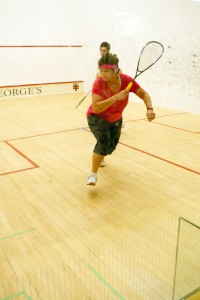
Facing Grainger, however, would be a learning experience. “When I was playing Natalie I was a bit overwhelmed in the beginning,” said Sobhy. “I wasn’t used to playing at such a constant fast pace throughout the entire match. She has such a variety of shots and pace, which is something I know I have as well but I haven’t found the timing of when to hit those shots yet. I guess that’s the experience part and Natalie has a tremendous amount of experience. It definitely was a privilege to play someone who has been at the top for many years.”
Yes, the final was dominated by Grainger as she cruised to a three-game sweep, 11-3, 11-4, 11-7. But the score line doesn’t show that Sobhy belonged in the final in this year’s draw. She, too, punishes the ball and uses the entire court to her advantage. Sobhy’s confidence grows with each match she plays, and at just 16-years-old, her name—and that of Blatchford—could one day be etched on the permanent trophy.
In 1997, New York’s Jay Nelson won his tenth U.S. Softball Championship, capturing the first of his five consecutive titles in the Men’s 55+. And that was on the heels of his five consecutive 50+ wins. To say he would be a dominant figure in Masters play would be an understatement of monumental proportions. Since that last visit to Newport, Nelson has won 12 more
titles, including this year in the Men’s 65+. But unlike past victories, this one was nearly derailed in the semifinals.
Down 10-6 in the fifth game against Gerry Poulton, the deficit seemed insurmountable to most who were cheering the pair on. Last year, also in the semis, Nelson survived a nailbiter against Poulton, 12-10 in the fourth. Playing point-a-rally, these are the scenarios that make the scoring system compelling.
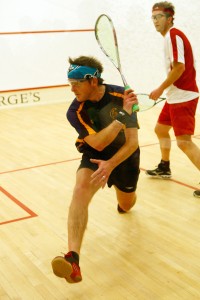
“There’s a good chance I’m going to lose, damn,” were the thoughts circling in Nelson’s head facing possible elimination. But the mind of a champion refuses to cave in, and Nelson clearly was not prepared to give up. “Well, let’s play from here on in with no thought to the score; just play points and see what happens,” were his next thoughts. From there, Nelson played solid points and was given one unforced error, bringing the match even at 10-10. Nelson then reached match ball, 11-10, but couldn’t convert. Instead, Poulton recovered to 12-11, and served for the match for the fifth time.
“Okay, play the point, and see what happens,” was the familiar approach Nelson took again. The payoff? A spot in the finals after winning the fifth game over Poulton, 14-12.
“Let’s face it, I was lucky, and Gerry unlucky,” said Nelson. “I happened to win a string of four points which probably happened for one or the other of use three or four other times during the match—at a critical time. The one thing I did right was to play within myself, certainly anxious, but not panicky and not heroic; a little fatalistic, but still plugging.”
The final was dominated by Nelson over Ned Monaghan in three games. Sometimes it’s good to be lucky, but Nelson was more than that. He is a 22-time softball champion and five-time hardball champ. Luck may have been on his side, but experience showed him the way to victory.
As for the others returning to Newport, hoping to repeat their 1997 successes, Charles Butt and Wendy Ansdell were runners-up in the Men’s 80+ and Women’s 40+ respetively, but only Dominic Hughes left a winner this year, capturing the Men’s 45+ over Andre Maur in four games.


